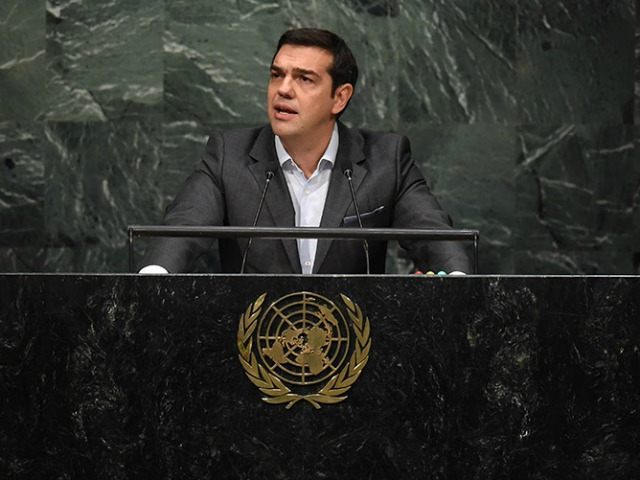Greek Prime Minister Alexis Tsipras urged listeners at the UN General Assembly Thursday to avoid “the same old recipes” to solve conflicts, and warned against “unilateral action” to solve problems like the civil war in Syria, which may put Tsipras at odds with his Russian allies.
Tsipras addressed a number of topics relevant to the state of Greece: the European migrant crisis, which has hit Greece particularly hard; the debt crisis afflicting his nation; the Greek-Turkish divide in Cyprus; and the Syrian Civil War. He began by defining “the biggest challenge we face today” as “an existential one: to try the same old recipes … or to try to reclaim our future step by step with confidence but also with the ability to learn from our mistakes.”
“We do not believe the future of Europe or the future of our world can be built on higher walls or children dying on our doorsteps,” he said–an indirect criticism of nations like Hungary, which have begun constructing walls to keep migrants out. “We cannot allow racism and xenophobia to destroy our common principles,” he concluded.
The most surprising remarks Tsipras made regarded Syria itself, however, not its fleeing populace. “Greece has been striving to bolster regional security and supports all efforts promoting peace and stability,” he noted, then condemned “unilateral” actions in the region:
We hear some insisting that we should embark upon unilateral initiatives, without considering their prospects and consequences, or leave the conflicts to solve themselves without contributing to stabilization and reconstruction. These are exactly the mistakes that brought us here in the first place. We do not have the luxury of making foreign policy choices without examining what the consequences will be.
Russia began an airstrike campaign in Syria on Wednesday to defend its ally, President Bashar al-Assad. A Russian general gave the United States and other international actors a one-hour notice that the strikes were to begin. The unilateral move, which has reportedly not targeted the Islamic State, but, instead, U.S.-affiliated Syrian rebels, has triggered a wave of criticism from the United States. Secretary of Defense Ashton Carton declared in a press conference Wednesday that the approach was “doomed to fail.”
Tsipras, who was elected Prime Minister as a member of the Coalition of the Radical Left, has long maintained friendly relations with Russia. Russian President Vladimir Putin invited Tsipras to Moscow in February, following his first election victory, and as Greece’s financial relationship with the EU grew uncertain throughout the year, many expected Tsipras to turn to Russia for financial aid, though he ultimately chose to accept austerity terms for a deal with the EU and IMF.
Tsipras has been previously silent on the war in Syria itself. On Tuesday, Tsipras told reporters the UN had a responsibility to “redouble their efforts in resolving the conflicts in Syria and Libya and to deal with jihadism. Diplomatic decisions, which would involve all main regional actors, are needed.” At the time, Turkey and the United States were the most active participants in the war against jihadism in Syria. Twenty-four hours later, Russia took the helm, so Tsipras’ comments Thursday can be interpreted as a rebuke of the Russian military approach to solving the Syrian war.
Tsipras concluded with kind words for the people who reelected him last month.“Even in their most difficult moments,” he said, the Greek people “are asserting their democratic right to choose their own fate … people insisting, even in their most difficult conditions, on their most basic human and democratic rights.” He asked the UN to respect and acknowledge this.

COMMENTS
Please let us know if you're having issues with commenting.